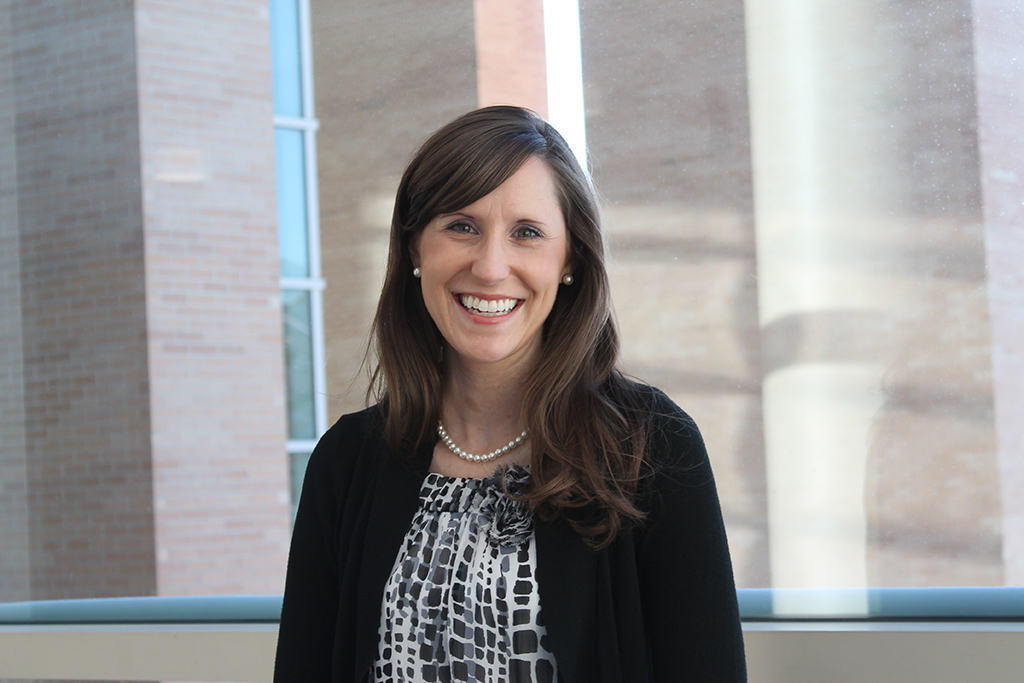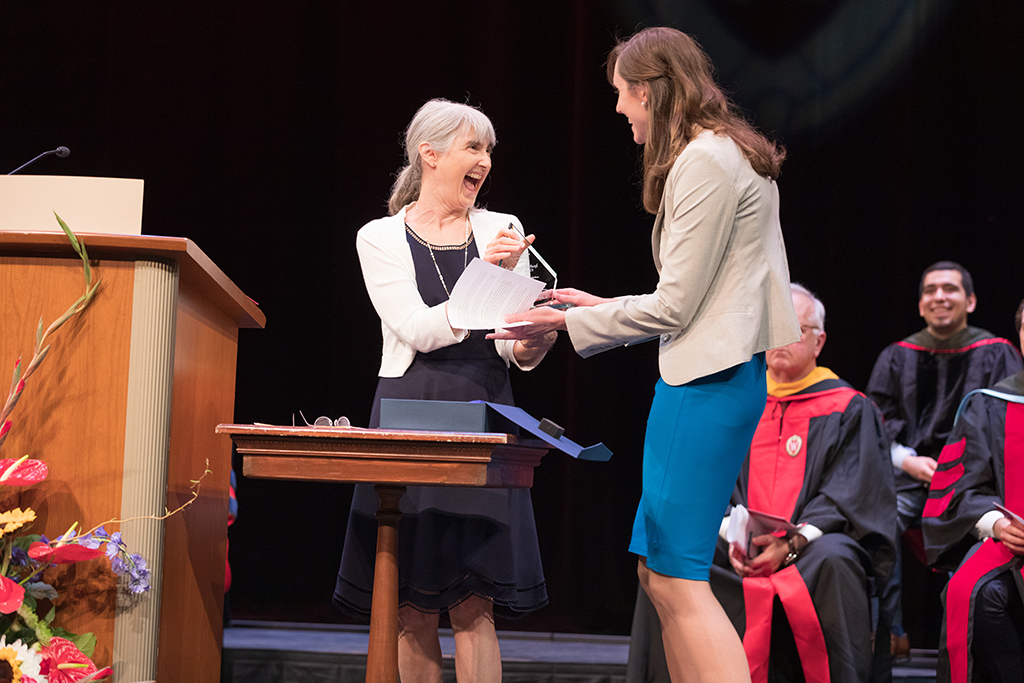
Alum and preceptor for the School of Pharmacy, Hartkopf is recognized nationally for providing tailored learning experiences for student pharmacists and residents
By Katie Ginder-Vogel
During her time, as a PharmD student at the University of Wisconsin–Madison School of Pharmacy, student technician, and intern, as well as during her residency, Kate Hartkopf (PharmD ‘08) remembers how important preceptor guidance was to her. It’s no wonder, then, that she eagerly anticipated her turn to become a preceptor.
As a PGY-1 resident at UW Health, she became a preceptor for pharmacy students on Introductory and Advanced Pharmacy Practice Experience rotations, in both community pharmacy and clinic settings. Concurrently, she completed the UW–Madison School of Pharmacy Teaching Certificate Program, where she learned about effective precepting, high-performing teaching teams, and accurate teaching assessments, which she diligently applied to her daily interactions with student pharmacists.
“I had the opportunity to set rotation expectations, enact the four preceptor roles, participate in collaborative learning with students, and provide formative and summative feedback,” says Hartkopf, who is now the pharmacy manager of ambulatory care services and PGY2 ambulatory care residency program director at UW Health.
“This recognition makes me grateful for the incredible preceptors and mentors I have had throughout my career.”
—Kate Hartkopf
Since then, she has continued precepting the School of Pharmacy’s student pharmacists and began precepting for UW Health’s pharmacy residency programs. She carefully tailors what she teaches each student to align with their specific career aspirations.
And her work and practice has paid off: This year, the American Association of Colleges of Pharmacy (AACP) is honoring her as a 2022 Master Preceptor, in recognition of her dedication to excellence in experiential education and professional practice.
“It is incredibly humbling to be nominated and recognized with this award,” Hartkopf says. “This recognition makes me grateful for the incredible preceptors and mentors I have had throughout my career. It has been my goal to emulate their positive teaching habits in my interactions with learners, and I hope they are able to feel proud of the ripple effect of their positive influence.”

As an alum of the School of Pharmacy, Hartkopf, who was honored as the Pharmacy Alumni Association’s 2017 Young Alumnus of the Year, takes a special pride in maintaining her connection with the School and helping to develop its student pharmacists into tomorrow’s pharmacy leaders.
“I am honored to give back to the UW–Madison School of Pharmacy by being a preceptor and active alumnus, after being afforded so much through my professional education,” she says. “I feel fortunate to work at UW Health, where I have many opportunities to remain closely connected to the School through precepting, collaborative research, guest lecturing, committee involvement, and co-curricular participation. These activities are professionally satisfying and help to fuel my passion for the pharmacy profession.”
Deep, customized learning experiences
Hartkopf uses a multi-faceted teaching approach that hits every different learning style, enabling everyone she teaches to access and understand the material. For example, she’ll provide background reading materials on a specific topic and follow that with a discussion that emphasizes the important aspects of the topic. Then, she’ll ask learners to apply the information to a patient case, a role-playing activity, or a group project. She also pays attention to learners’ motivating factors, like assessments or skills they will regularly use at work, and sets clear expectations.
“It is important to have clear expectations about what the learners should accomplish by the end of the experience,” she says.
Hartkopf provides abundant resources and feedback and gives those she precepts responsibilities that allow them to apply their skills and explore new challenges. She relies on rotation expectation documents to provide learners with a clear understanding of how to successfully achieve the goals and objectives of the rotation.
“I am honored to give back to the UW–Madison School of Pharmacy by being a preceptor and active alumnus, after being afforded so much through my professional education.”
—Kate Hartkopf
“My personal philosophy also requires active learning and direct participation,” says Hartkopf. “This requires me to create an atmosphere that encourages collaboration and emphasizes creativity and innovation.”
Hartkopf’s practice in an academic medical center means that teaching and training future professionals is a core organizational mission. Preceptors at UW Health provide orientation, clinical resources, and a library of professional articles. They encourage students to schedule one-on-one time with them to discuss what they’re learning and provide learners with meaningful responsibilities.
“It is vital that learners work on meaningful and impactful assignments, patient care responsibilities, and rotation projects,” Hartkopf says. “Introductory Pharmacy Practice Experience (IPPE) students early in their PharmD programs and interns are often delegated tasks and projects that allow for baseline collection of information about an unfamiliar process or program and a scalable scope of responsibility. Later in their education, during each Advanced Pharmacy Practice Experience (APPE) rotation, the learner is encouraged to participate at the level of a colleague and are given training and opportunities to achieve this throughout the rotation.”

The APPE students in Hartkopf’s administrative clinical leadership rotation directly participate in administrative meetings with Hartkopf and actively facilitate projects that are department and organizational priorities. APPE students are expected to facilitate and complete an average of six projects by the end of their six-week APPE rotations.
“The assigned projects provide learners the opportunity to develop prioritization, time management, and quality improvement skills,” says Hartkopf. “Additionally, these learners directly interface with frontline pharmacy team members and complete a presentation by the end of the rotation.”
Through that process, preceptors encourage self-reflection and professional development with summative and formative feedback.
Advice for early preceptors
Hartkopf encourages preceptors new to the role to embrace three things: co-precepting, learning with students, and using an expectations document. Early in her career, she served as a co-preceptor with seasoned preceptors, which helped her develop her own precepting style. That’s when she realized she didn’t have to know everything to be an effective instructor.
“Precepting provides a great opportunity to learn together,” she says. “Learners have also appreciated knowing and experiencing situations where there isn’t a clear and obvious answer. It helps them experience firsthand that they will always be on a continuum of learning.”
She has also discovered that an expectations document is vital.
“It is rewarding to collaborate with student pharmacists during their journey of becoming future peers and colleagues. I am continually impressed by their drive and commitment to refine themselves to achieve greatness.”
—Kate Hartkopf
“Learners expect and appreciate knowing how they will successfully achieve this experience,” she says. “This also sets the tone for the pace and output of the learning encounter.”
She says it can be applied to projects and assignments, too, and advises other preceptors and instructors to set clear expectations for the final product and timeline.
“Ask the learner for drafts and constant communication about progress, barriers, and next steps,” she says. “Be prepared to tailor the expectations, based upon the size and scope of projects, and reset expectations if progress is not happening as expected.”
Finding fulfillment in teaching
Hartkopf says precepting is one of the most fulfilling aspects of her career.
“I relish the opportunity to collaborate with young professionals in lifelong learning,” she says. “Though I entered precepting experiences expecting to give much to learners, I have found that I gain as much, if not more, from each precepting interaction and relationship built.”

Hartkopf recognizes that each learner brings an individualized set of lived experiences that allows them to experience the rotation with a different lens.
“Working with student pharmacists and residents allows me to reinforce foundational and operational aspects of my job through direct instruction,” she says. “Their questions and new approaches challenge me to continually evaluate and improve internal programs and processes.”
Hartkopf enjoys the unique opportunity to witness students’ growing confidence when she coaches and encourages them to own their assigned rotation responsibilities, engage in professional writing activities, and pursue formal quality improvement work. She finds herself entrusted with many career counseling conversations, as the young professionals she mentors navigate their future career opportunities.
“The ability to impact the lives of young professionals who go on to impact patient care outcomes directly and positively is exponential as a preceptor,” she says. “It is rewarding to collaborate with student pharmacists during their journey of becoming future peers and colleagues. I am continually impressed by their drive and commitment to refine themselves to achieve greatness.”
Learn more about Kate Hartkopf and her 2017 Young Alumnus of the Year Award.